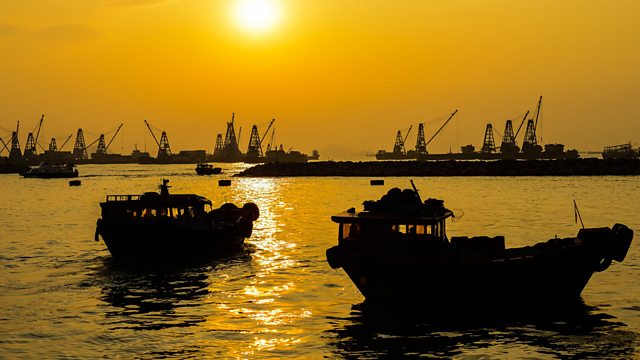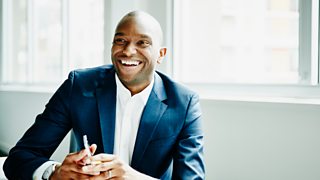Connections with the sea
Do you live by the coast, or far inland? This week’s programme looks at the goods, ideas and dangers that can come from the sea, to reach us all.
Exploring our connections with the sea; the goods that arrive by ever larger ships; the ideas that ocean travellers bring, and the identities that are shaped by proximity to the water. Bridget Kendall is joined by Marco Pluijm, a leading port designer; Croatian novelist and coast-dweller Dasa Drndic, and historian of the sea David Abulafia.
Photo shows Hong Kong harbour
Photo by Philippe Lopez/AFP/Getty)
Last on
More episodes
Chapters
-
Marco Pluijm
Duration: 14:35
Dasa Drndic
Duration: 08:25
60 Second Idea
Duration: 04:48
David Abulafia
Duration: 12:42
Marco Pluijm
![Marco Pluijm]()
Marco Pluijm is a port planner and designer from the Netherlands, who currently works for the engineering and construction firm Bechtel, in London. He has designed and built ports all over the world, from the Americas to Asia and Africa. He is heading up a new piece of research called ROPES, which is assessing the damage that ever-larger cargo ships are doing to the ports they use, and drawing up guidelines for safer ports of the future.
Dasa Drndic
![Dasa Drndic]()
Croatian novelist Dasa Drndic experiments with form in her writing, creating multi-layered collages of fact and fiction. She is best known in the English speaking world for her novel Trieste, which is set in north eastern Italy during the Second World War. Dasa lives on the Croatian coast in the ex-Austro-Hungarian port of Rijeka, and laments the fact that it is a town that seems to have turned its back on the sea.
David Abulafia
![David Abulafia]()
As Professor of Mediterranean History at Cambridge University, David Abulafia has written extensively on that sea as an agent of cultural and economic exchange, most recently in The Great Sea – A Human History of the Mediterranean. His current book project ventures beyond the Mediterranean and into the Atlantic, Caribbean and Indian oceans – and his common thread of interest is in the people, like his ancestors, who have dared to leave their own countries and travel by sea to foreign shores.
60 second Idea to Change the World
Historian David Abulafia proposes a day each year when we all vow not to touch anything made of plastic. Plastic is ruining the seas, as it decomposes into globules that cannot be digested by the fish who eat them, so they die. A day without plastic would mean citizens of Singapore and Australia couldn't use money because their bank notes are printed on plastic; it would mean no credit cards, computers or mobile phones, because there is always plastic somewhere: the keyboard, the screen, the earphones. We’d have to use pencils not biros (for those who still put pen to paper). Doing this just for one day would make us all aware of how much plastic intrudes in our lives, and might encourage us to think of alternatives.
In Next Week’s Programme
What modern society can learn from tribal traditions: with ornithologist and polymath Jared Diamond, Nepalese-Indian novelist Prajwal Parajuly, and South African anthropologist Rose Boswell.
Broadcasts
- Sat 26 Jan 2013 13:05GMT����ý World Service Online
- Sat 26 Jan 2013 23:05GMT����ý World Service Online
- Sun 27 Jan 2013 02:05GMT����ý World Service Online
Do you think political or business leaders need to be charismatic? Or do you prefer highly competent but somewhat stern people?
Podcast
-
![]()
The Forum
The programme that explains the present by exploring the past






